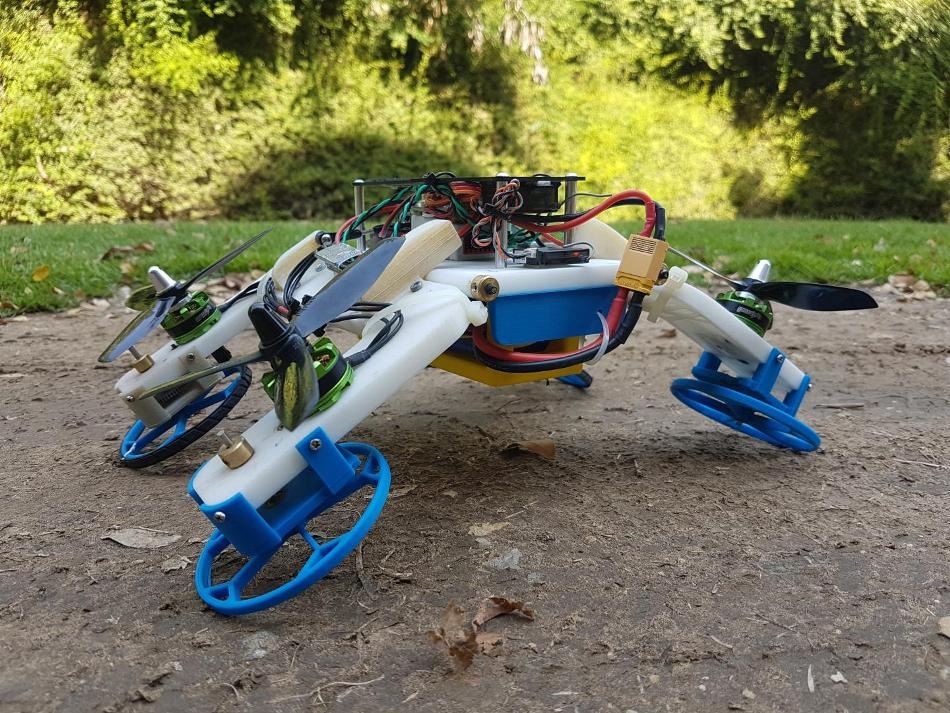May 21 2019
Researchers at Ben-Gurion University of the Negev (BGU) have developed the first experimental robot drone that glides just like a standard quadcopter, squeezes into tight spaces, and drives on tough terrain using the same kind of motors.
 The first experimental robot drone that flies like a typical quadcopter, drives on tough terrain and squeezes into tight spaces using the same motors, has been developed by Ben-Gurion University of the Negev (BGU) researchers. The hybrid FSTAR (flying sprawl-tuned autonomous robot) will be introduced at the International Conference on Robotics and Automation 2019 in Montreal on May 21, 2019. (Image credit: Ben-Gurion U.)
The first experimental robot drone that flies like a typical quadcopter, drives on tough terrain and squeezes into tight spaces using the same motors, has been developed by Ben-Gurion University of the Negev (BGU) researchers. The hybrid FSTAR (flying sprawl-tuned autonomous robot) will be introduced at the International Conference on Robotics and Automation 2019 in Montreal on May 21, 2019. (Image credit: Ben-Gurion U.)
The hybrid flying sprawl-tuned autonomous robot, or FSTAR in short, will be launched at the International Conference on Robotics and Automation 2019 in Montreal on May 21st. Professor David Zarrouk, a senior lecturer in BGU’s Department of Mechanical Engineering and head of the Bio-Inspired and Medical Robotics Lab, and his graduate student Nir Meiri, developed the FSTAR in the BGU Bio-Inspired and Medical Robotics Lab.
FSTAR can run underneath or fly over obstacles. The sprawl, which alters from a flat configuration to 55 º, enables the robot to change its movement from a flying quadcopter to a robot looking like a car. In addition, it alters its width to run or crawl on flat surfaces, squeeze through a pipe, tunnel, or tight spaces, or climb over huge obstacles and up closely-spaced walls.
The robot is capable of running on the ground at a speed of around eight feet per second (2.6 m/second). Together with low energy consumption utilizing the same kind of motors, the FSTAR is perfect for many different applications where longer work time may be needed.
Potential commercial applications of the FSTAR include package deliveries as it can rapidly fly to a specified target zone and subsequently use its wheels to drive safely and quietly to reach the doorstep of the recipient. In addition, the robot can be utilized in search and rescue applications since it can fly over numerous obstacles and sneak underneath or between cracks where a standard drone will not be able to fly. Agriculture, cleaning, maintenance, entertainment, filming, anti-terrorist applications, and law enforcement are other potential applications of the FSTAR robot.
We plan to develop larger and smaller versions to expand this family of sprawling robots for different applications, as well as algorithms that will help exploit speed and cost of transport for these flying/driving robots.
Dr David Zarrouk, Professor and Senior Lecturer, Department of Mechanical Engineering, BGU
The BGU study was partly supported by the Helmsley Charitable Trust via the Agricultural, Biological and Cognitive Robotics Initiative (ABC Robotics) and by the BGU Marcus Endowment Fund. The Marcus legacy gift, of more than $480 million, was donated in 2016 to American Associates, the Ben-Gurion University of the Negev by Dr Howard and Lottie Marcus. The donation is the largest gift given to any Israeli university and is considered to be the largest gift to any Israeli institution.